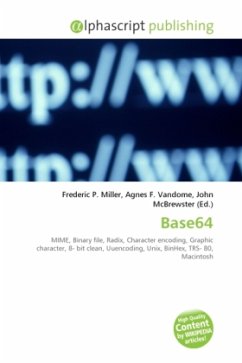The term Base64 refers to a specific MIME content transfer encoding. It is also used as a generic term for any similar encoding scheme that encodes binary data by treating it numerically and translating it into a base 64 representation. The particular choice of base is due to the history of character set encoding: one can choose a set of 64 characters that is both part of the subset common to most encodings, and also printable. This combination leaves the data unlikely to be modified in transit through systems, such as email, which were traditionally not 8-bit clean. The precise choice of characters is difficult. The earliest instances of this type of encoding were created for dialup communication between systems running the same OS - e.g. Uuencode for UNIX, BinHex for the TRS-80- and could therefore make more assumptions about what characters were safe to use. For instance, Uuencode uses uppercase letters, digits, and many punctuation characters, but no lowercase, since UNIX wassometimes used with terminals that did not support distinct letter case.
Bitte wählen Sie Ihr Anliegen aus.
Rechnungen
Retourenschein anfordern
Bestellstatus
Storno








